Key takeaways:
- Learning programming enhances critical thinking, creativity, and problem-solving skills, making it a valuable asset in today’s tech-driven world.
- Immersive practice, breaking down concepts, and project-based learning are effective strategies for mastering programming languages.
- Setting clear, achievable goals and adjusting them as needed can significantly enhance the learning journey and motivate progress.
- Engaging with communities and collaborating with peers accelerates learning and deepens understanding of programming concepts.
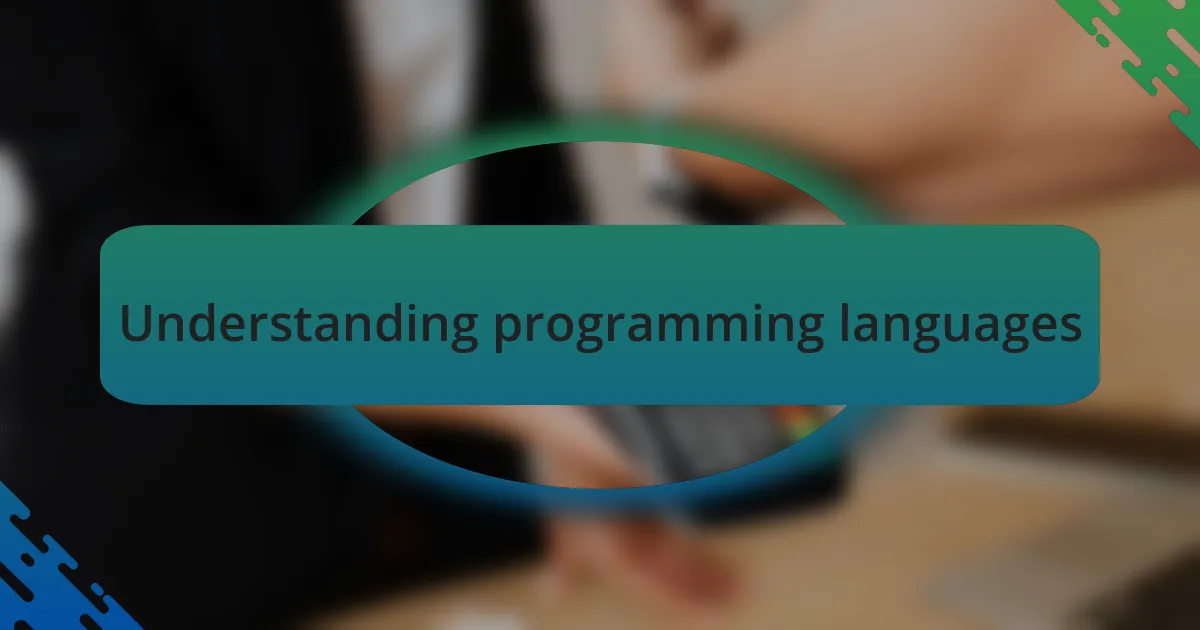
Understanding programming languages
Programming languages are like unique dialects in the vast conversation of technology. When I first encountered Python, I felt an immediate spark of understanding—it was as if I’d been handed a map to a new world. Isn’t it fascinating how different languages can shape our thought processes and problem-solving abilities differently?
I remember when I dove into JavaScript; the syntax initially intimidated me. Yet, as I started experimenting, I realized it was the language that brought life to my web projects. How empowering is it to see code transform into interactive experiences?
Over time, I’ve learned that each programming language has its own philosophy and purpose. For instance, while C focuses on performance, Ruby emphasizes simplicity and productivity. Isn’t it remarkable how choosing a language can influence not only the technical outcome but also the developer’s experience?
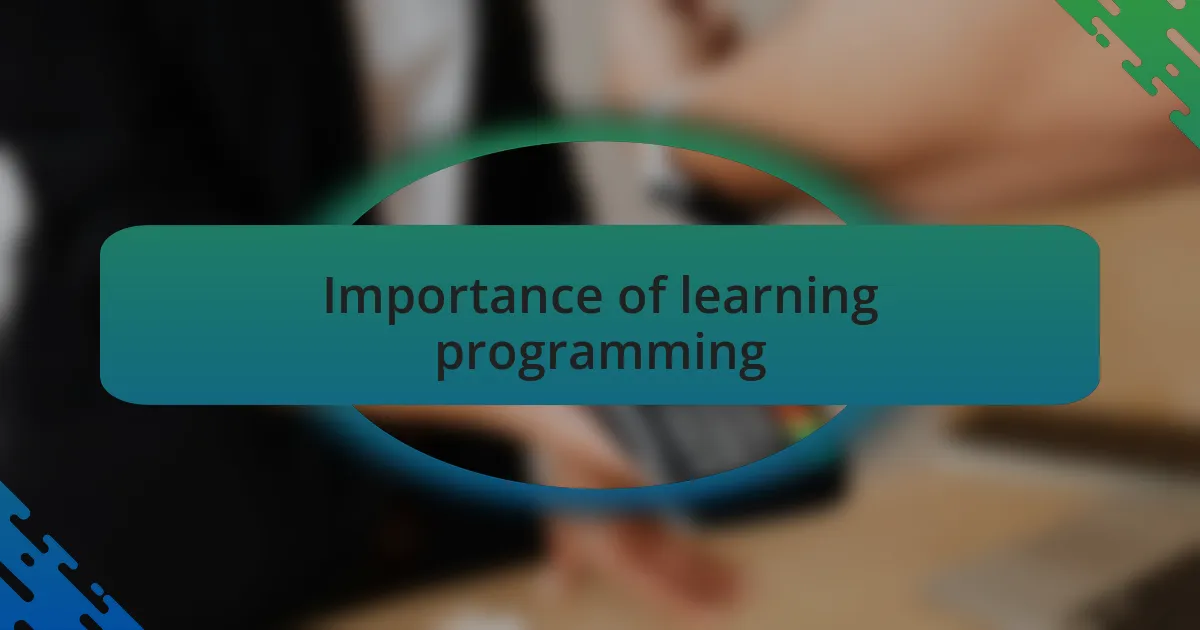
Importance of learning programming
Learning programming isn’t just about writing code; it’s a vital skill that unlocks countless opportunities. I remember feeling exhilarated the first time I solved a problem with a line of code—it’s like finding a key that opens a door to innovation. In today’s tech-driven world, being proficient in programming can set you apart in the job market and empower you to contribute meaningfully to projects you are passionate about.
As I delved into programming, I realized that understanding code is akin to learning a new language; it enhances your critical thinking and creativity. There were moments when complex algorithms challenged me, but overcoming those hurdles fueled my determination. Have you ever faced a challenge that made the sweet taste of victory even more rewarding? Learning programming fosters resilience, teaching you to approach problems from different angles until you find a solution.
Moreover, the thrill of creating something from nothing is unmatched. When I wrote my first functioning application, a sense of accomplishment washed over me—like crafting a piece of art. This feeling reinforces why learning programming is essential; it not only hones technical skills but also nurtures a mindset geared towards problem-solving and innovation. Isn’t it amazing how learning programming can significantly shift your perspective on challenges in both personal and professional domains?
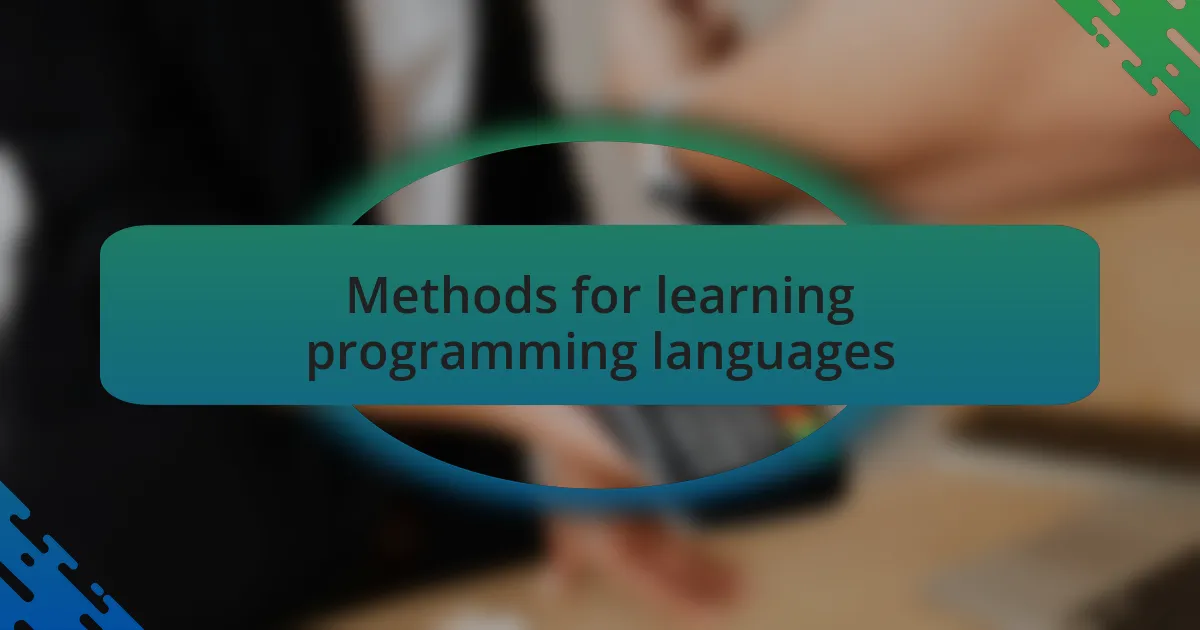
Methods for learning programming languages
One effective method I’ve found for learning new programming languages is immersive practice. When I took on the challenge of learning Python, I joined a coding community where members shared their projects and collaborated on tasks. This hands-on approach not only reinforced what I learned through tutorials but also provided immediate feedback, making the learning experience feel dynamic and alive. Have you ever noticed how much faster you pick up a skill when you’re surrounded by passionate peers?
Another strategy that worked wonders for me was breaking down complex concepts into smaller, digestible pieces. For instance, while learning JavaScript, I focused first on understanding the basics, like variables and functions, before diving into advanced topics such as promises and async/await. This step-by-step process helped me build a strong foundation and allowed me to celebrate small victories along the way. Isn’t it gratifying to tackle a daunting subject by conquering one small step at a time?
Finally, I discovered that project-based learning is incredibly impactful. After grasping the fundamentals of Ruby, I decided to tackle a real-world problem by creating a simple web application. Working on this project not only solidified my understanding but also sparked my creativity—seeing my code function in a tangible way was exhilarating. Have you tried applying what you’ve learned to a personal project? It can truly transform your understanding from theory to practice.
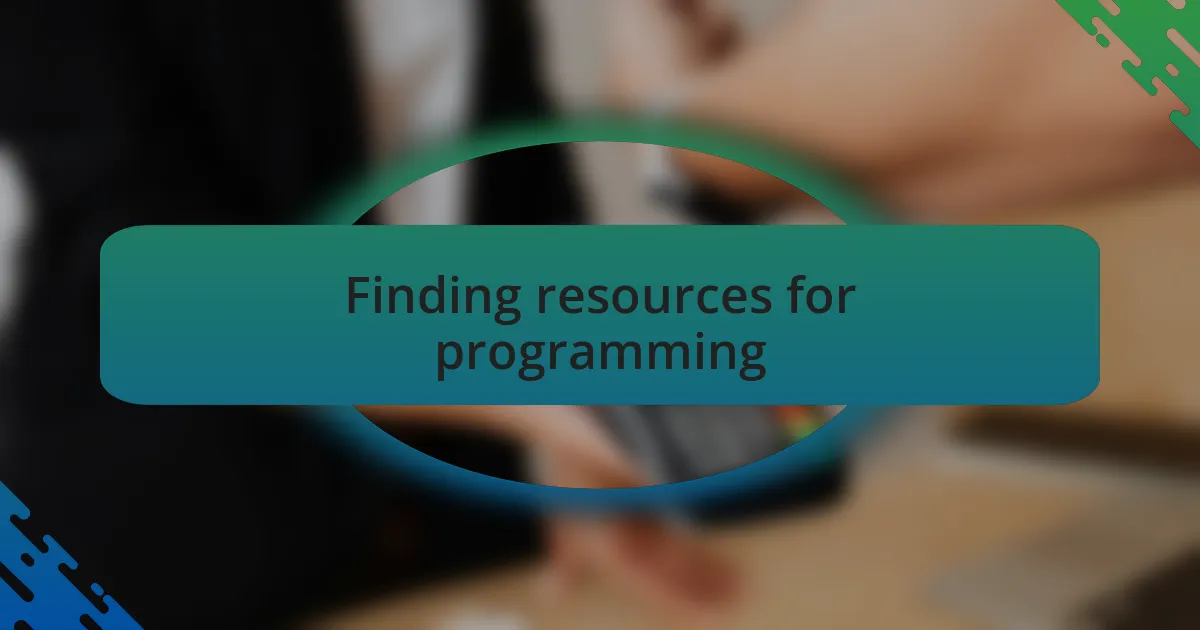
Finding resources for programming
When it comes to finding resources for programming, I’ve often turned to online platforms like GitHub and Stack Overflow. I remember next diving into a new language and realizing that the wealth of open-source projects on GitHub provided a goldmine of real-world example code. Diving into other people’s projects not only helped me understand different coding styles but also highlighted how to structure my own work. Have you ever explored a project and thought, “Wow, I never would have approached it that way!”
Additionally, I’ve found that online courses can be incredibly effective, especially those with interactive components. For example, when I enrolled in a course on Kotlin, the hands-on exercises allowed me to apply what I was learning in real time. Have you experienced that adrenaline rush of completing a challenging assignment? It was during those moments that I felt my skills truly expanding, paving the way for greater confidence in tackling new challenges.
Lastly, I can’t stress enough the value of community forums and social media groups. Engaging with others who are learning alongside you can make a significant difference. I remember joining a Facebook group dedicated to learning Go; the discussions were not only lively but also packed with insights. How often do you find a simple question leading to an incredibly enlightening conversation? Those exchanges helped deepen my understanding while also building my network.
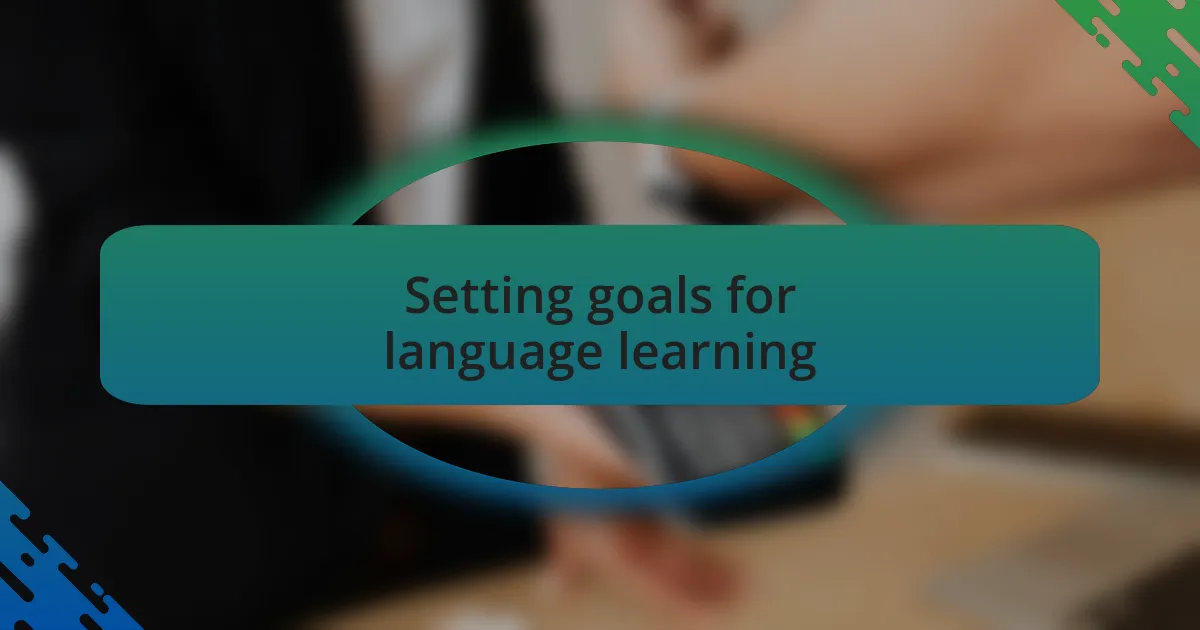
Setting goals for language learning
Setting clear goals is a cornerstone of learning a new programming language. Personally, I’ve found that defining what I want to achieve has made all the difference. For instance, when I set out to learn Python, my initial goal was to build a simple web scraper. This tangible objective kept me motivated, especially when I faced those frustrating moments—like when I couldn’t get my code to run, and I thought, “What am I even doing wrong?”
I’ve also realized that breaking down larger goals into smaller, manageable tasks can be incredibly helpful. When I wanted to master JavaScript, I started with the fundamentals, focusing on one topic at a time—such as understanding functions before moving on to asynchronous programming. This method took away the overwhelming feeling of learning too much at once. Have you ever experienced a breakthrough after focusing just on the basics? Those moments are powerful.
Moreover, revisiting and adjusting my goals as I progressed has enhanced my learning journey. I remember setting out to learn Swift to develop an app, but as I delved deeper, I discovered a passion for mobile UI design. By shifting my goals to incorporate user experience, I found not only a more enjoyable path but also a broader skill set that I didn’t initially anticipate. Isn’t it exciting when your learning journey takes unexpected turns?
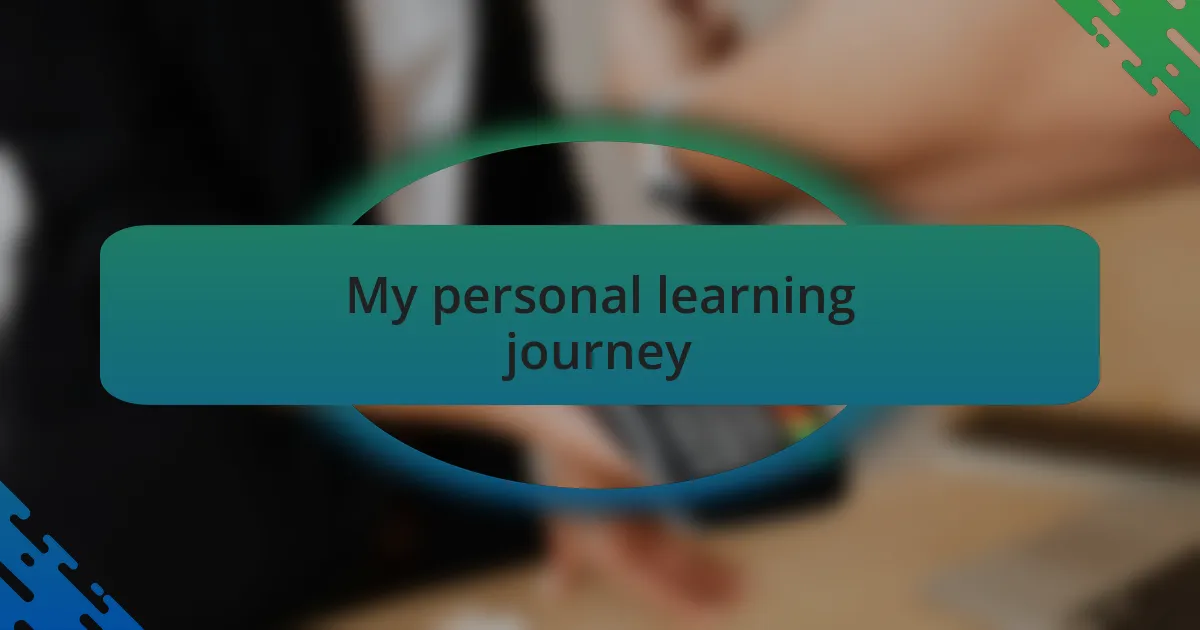
My personal learning journey
Diving into the world of programming languages has been nothing short of an adventure for me. When I first tackled Ruby, I remember the initial excitement mixed with a hint of anxiety. As I navigated through the syntax, I often asked myself, “Am I cut out for this?” Each time I stumbled, I reminded myself that struggles are just stepping stones towards mastery.
As I progressed, I realized that each programming language presents a unique personality. Learning Go, for instance, felt like stepping into a minimalist space designed for efficiency. I became truly engaged when I started experimenting with concurrency. Watching my code execute tasks simultaneously was exhilarating. Have you ever felt that rush of accomplishment when you finally get complex code to work?
Reflecting on my journey, what stands out is the constant evolution of my interests. After learning Kotlin, I stumbled into open-source contributions, which sparked a newfound passion for collaboration. It’s fascinating how one language can unlock various doors. Have you ever found that a simple skill can lead you to unexpected opportunities? My experience has taught me that each programming language is not just about syntax; it’s a pathway to growth.
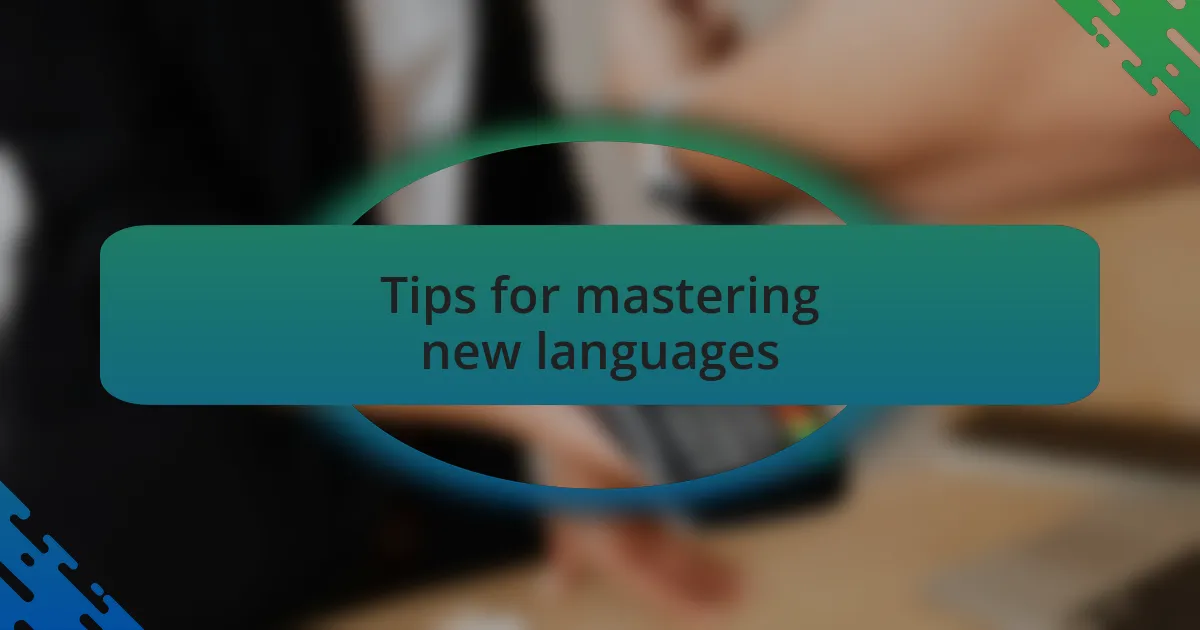
Tips for mastering new languages
To effectively master a new programming language, immersing yourself in practice is essential. I recall spending countless weekends working on personal projects just to apply what I had learned. That hands-on experience not only reinforced my skills but also made me feel connected to the language itself. Have you ever felt that moment when your code clicks and you finally see the results of your hard work?
Another strategy that has worked wonders for me is finding a community. I was fortunate to stumble upon a local programming group that met weekly. Sharing challenges and solutions with fellow learners was invaluable. Discussing ideas and getting feedback transformed my understanding in ways I hadn’t anticipated. Have you ever found that exchanging insights with peers accelerates your learning?
Finally, I always recommend setting specific goals. Early in my journey, I decided to build a functional application using the new language I was learning. This approach not only kept me motivated but also provided a clear direction for my studies. I find that having a tangible outcome can really solidify the learning process. What goals could you set for yourself to track your progress?